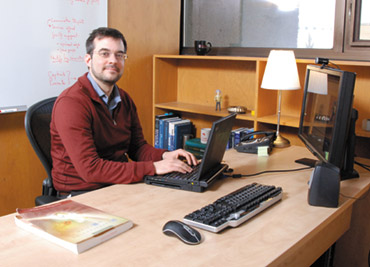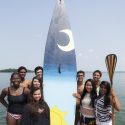Designer aims to improve student-centered learning in engineering
When an exam comes back with an “A” grade, most students are thrilled, and rightfully so. Yet all too often, it doesn’t take long for the information students diligently crammed to fade as they prepare for another exam, creating a cycle, for some, of studying for tests rather than actually learning.

Ryan Kershner has joined Wendt Commons as an instructional designer, which will allow him to focus on developing teaching and learning innovations through collaborations with other faculty members and Wendt staff. Courtesy: Wendt Commons
It’s a cycle Ryan Kershner found frustrating as a mechanical engineering assistant professor, but his time and resources were too limited to address the need for more active, student-centered learning in his classes.
“There were so many innovative things I wanted to try in the classroom, but I couldn’t justify making those things my absolute focus while balancing research responsibilities,” he says.
However, Kershner couldn’t ignore his growing passion to make a difference in the classroom, and he has found a unique opportunity to do just that. Kershner has joined Wendt Commons as an instructional designer, which will allow him to focus on developing teaching and learning innovations through collaborations with other faculty members and Wendt staff.
Wendt Commons is the new consolidation of the Engineering Learning Center, Engineering Media Services and Wendt Library. The initiative aims to expand the impact of these services on teaching, learning and research throughout the College of Engineering.
“Wendt Commons is a central location where faculty can come for support if they want to try something new or need ideas to get started,” Kershner says. “A lot of innovative tools and approaches have been developed, and we need to capitalize on those successes and scale them up in a coordinated way. That’s a big challenge that Wendt Commons can help address.”
Instructional design is the art and practice of applying research about how people learn to improve learning outcomes for students. “It doesn’t necessarily have to be technology-focused, but technology can play a big role in finding ways to engage students and develop instructional materials,” Kershner says. “It is really about finding ways to improve retention — actual learning.”
A large part of Kershner’s role will be assessing engineering faculty needs and opportunities, making his three years of experience as a UW–Madison faculty member invaluable. “I know the demands placed on faculty and what it’s like to be on the front lines in the classroom,” he says. “They may have ideas and want to explore, but they just don’t have the time. There are a lot of technologies we’re not taking advantage of that speak to the way students today operate.”
The key element of his position will be partnerships with faculty to develop solutions that meet their needs. Kershner anticipates helping faculty explore blended learning approaches that combine traditional lecture formats with, for example, more opportunities for students to receive immediate feedback, a feature today’s students are accustomed to in online environments. Additional approaches could include more in-class case studies or design projects, as well as multimedia tools, such as lecture visualizations.
“A lot of research has found that students from different backgrounds and learning styles don’t always fit a traditional model,” Kershner says. “The idea is to provide more diversity in teaching to capture more diverse students.”
Wendt Commons is closely integrated with the Engineering Beyond Boundaries initiative, a long-term transformational initiative in the College of Engineering that encourages faculty and staff to rethink engineering academic culture and traditional engineering education techniques.
“Ryan brings a terrific combination of experience with and enthusiasm for both educating engineers and exploring how technology can improve learning,” says Wendt Commons director Deborah Helman. “With his addition to the Wendt team, we are poised to expand our services and partner with college faculty and instructors to further develop their courses. This is a very exciting time for Wendt Commons and teaching and learning in the College of Engineering.”
Kershner also plans to cross campus boundaries and explore what faculty members outside engineering are doing. “I’ll be finding those other ideas and bringing best practices back to the college,” he says. “It’s exciting to be in education right now and to be part of a renewed commitment to teaching and learning across campus.”
Engineering faculty and instructors are invited to contact Wendt Commons for teaching and technology-enhanced learning support.
Tags: engineering



